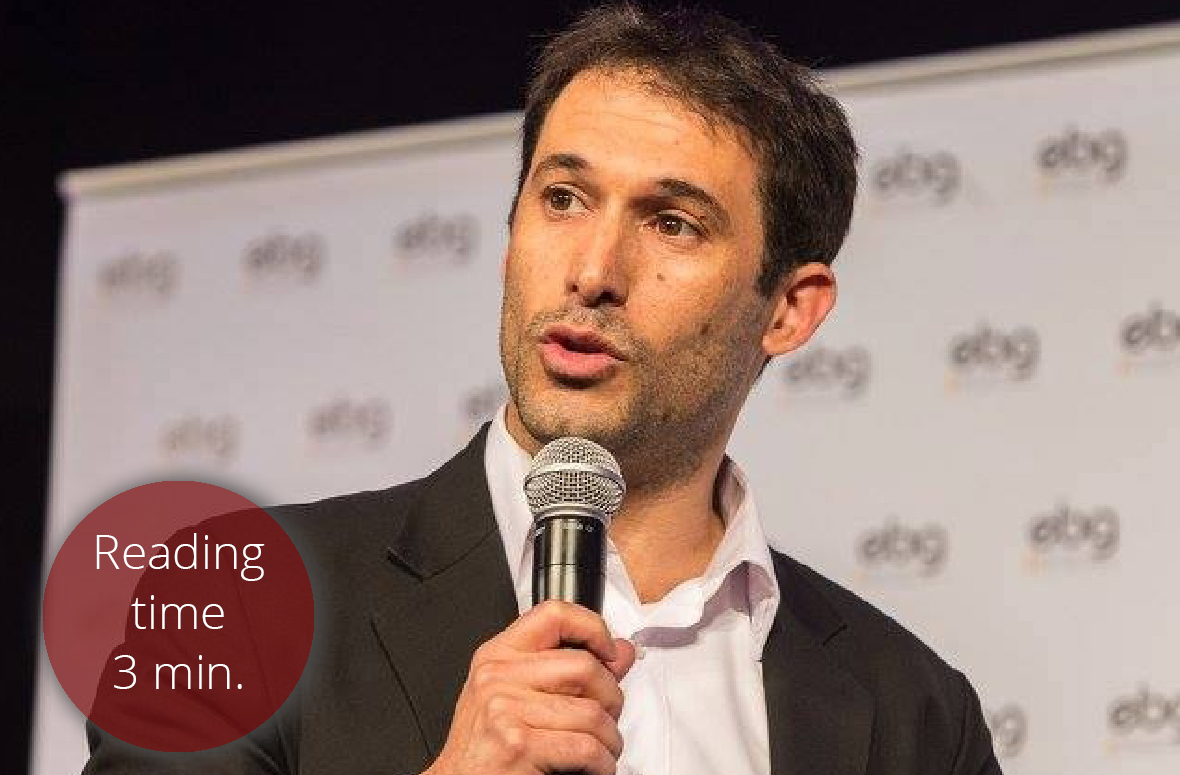4 Reasons why an early-stage startup should hire a chief operating officer
12.08.2023

The COO: Mentor, CEO’s right hand, secret weapon.
The role of the chief operating officer (COO) in the corporate world has long been underestimated, but that perception is now changing. According to McKinsey & Company, 40% of leading companies had a COO in 2022, an 8% increase compared to 2018. The role itself has evolved, becoming “bigger, bolder, and more transformative than ever before.”
The specific responsibilities of COOs vary depending on the industry, stage, and long-term needs of a company. But in most cases, they resemble a chef on the kitchen floor: they closely collaborate with department heads to support employees’ day-to-day activities.
Over the past five years, I’ve helped startups of various industries and sizes with operations. Here’s why I believe any company should consider hiring a COO once it starts growing.
Reason #1. More productive, engaged workforce
It's common for a COO to take on some of the HR responsibilities, improving both productivity and the overall work environment at the company.
For example, a COO can introduce automation tools to the teams, including CRM systems or productivity tools like Asana, Zoho Flow, or Jira.
“One of the vectors of my activities as a COO is to create an environment that allows the team to automate most operational tasks in order to focus on the main thing: educating students,” says Anna Apostol, CEO & COO at edtech startup Mate academy.
In small teams, a COO can fulfill the HR role, improving communication and the working environment. According to Frost & Sullivan, on average, effective teamwork has been shown to boost company sales by 27% and product development by 30%.
Apostol says a COO can contribute by establishing regular 1:1 meetings between employees and their managers, a practice that 71% of workers claim boosts workplace engagement. “Just because my startup has properly set up 1:1 meetings, we can postpone hiring an HR manager until the team exceeds 130 employees,” she says.
These are just two of the HR-related tasks a COO can do. Others include employee development and training, performance management, workforce planning, and HR policy development.
If you have a small team and want to increase collaboration between departments, at this stage, a COO will be more useful than an HR manager. A COO typically has a broader scope of responsibilities, including operational, strategic, and organizational aspects. And with a limited number of staff members, a COO can handle HR as one of their tasks.
Reason #2. Easier expansion
Before startups start to expand, enter new markets and hire new people, they need a strategy and an enforcer of that strategy. At a growing startup, a COO is a person who connects the company’s strategists with doers.
Having a helicopter view of the company’s day-to-day operations, a COO can translate the marketing and strategic plans into actionable steps. They coordinate with various teams and departments to ensure smooth execution and alignment with the firm’s goals.
A good illustration of this is Sheryl Sandberg’s tenure as COO at Facebook, which started in 2008 when the company was still relatively small and had a limited global presence. Sandberg spearheaded the expansion of Facebook’s reach by recruiting local teams in new markets and customizing the product for various regions.
With her background in economics and prior experience as a vice president of global online sales and operations at Google, she possessed a deep understanding of technology, operations, and business strategy. This allowed her to effectively oversee Facebook's day-to-day operations and manage resources.
Sandberg was the first who shaped the role of COO at Facebook. Hiring her proved to be a successful strategy for the social network’s expansion: today it has 2.8 billion users.
If founders want to improve this aspect in their startup, they need a COO with the knowledge of market entry strategies, who understands local regulation and culture, and who can build partnerships in new regions (ideally, who knows the language and/or lives in that country).
Reason #3. Fine-tuned product development
Only 66% of businesses have aligned their strategy with the product development process, which, according to studies, gives them a significant advantage over their competition. Hiring a COO can help become one of those businesses.
Working closely with both the C-level managers and product developers, a COO takes part in developing the strategy and then assigning tasks.
From 2016 to 2019, Linda Kozlowski served as the COO of Etsy. During her tenure at the marketplace, she worked on improving service for sellers and the overall buyer experience. She helped make Etsy a more user-friendly and efficient platform for both sellers and buyers.
“She [was] instrumental in enabling Etsy to expand our global base of buyers, improve the shopping experience, and launch new products that make it easier for sellers to succeed,” said Etsy CEO Josh Silverman about Kozlowski.
For this task, a startup should look for a COO with a background in product management and who is well-versed in technology and software design. Other important aspects are data-driven decision-making and experience with agile methodologies.
Kozlowski, for example, before joining Etsy, worked as the COO and President of Evernote and held various leadership positions at Alibaba Group (senior vice president and general manager of the international division).
Reason #4. Financial management beyond crunching numbers
Financial management in startups is crucial; mistakes in this area can jeopardize the company’s survival. In fact, nearly 45% of startups failed in 2022 due to running out of cash. A startup's ability to effectively handle finances is also a significant factor for VCs when deciding whether to invest, particularly during the global financial crisis.
Not every startup founder, however, possesses strong financial management skills. Some might come from technical backgrounds, while others may have marketing or sales expertise.
While a financial manager typically focuses on budgeting, forecasting, financial reporting, and risk management, a COO has a broader operational focus.
For instance, if you need to plan a budget for launching a new product, a financial manager can handle the task. However, a financial manager primarily deals with numbers, whereas a COO can assess whether launching this new product is necessary at this particular time. They possess the knowledge to determine which specialists should be hired or outsourced, and how to tune the team to optimize resources.
To go beyond budgeting and reporting, it is advisable to seek a COO with expertise in strategic financial planning, cash management, and operations. This ensures that the company can align its financial goals with the overall business strategy more effectively.
The role of the chief operating officer (COO) in the corporate world has long been underestimated, but that perception is now changing. According to McKinsey & Company, 40% of leading companies had a COO in 2022, an 8% increase compared to 2018. The role itself has evolved, becoming “bigger, bolder, and more transformative than ever before.”
The specific responsibilities of COOs vary depending on the industry, stage, and long-term needs of a company. But in most cases, they resemble a chef on the kitchen floor: they closely collaborate with department heads to support employees’ day-to-day activities.
Over the past five years, I’ve helped startups of various industries and sizes with operations. Here’s why I believe any company should consider hiring a COO once it starts growing.
Reason #1. More productive, engaged workforce
It's common for a COO to take on some of the HR responsibilities, improving both productivity and the overall work environment at the company.
For example, a COO can introduce automation tools to the teams, including CRM systems or productivity tools like Asana, Zoho Flow, or Jira.
“One of the vectors of my activities as a COO is to create an environment that allows the team to automate most operational tasks in order to focus on the main thing: educating students,” says Anna Apostol, CEO & COO at edtech startup Mate academy.
In small teams, a COO can fulfill the HR role, improving communication and the working environment. According to Frost & Sullivan, on average, effective teamwork has been shown to boost company sales by 27% and product development by 30%.
Apostol says a COO can contribute by establishing regular 1:1 meetings between employees and their managers, a practice that 71% of workers claim boosts workplace engagement. “Just because my startup has properly set up 1:1 meetings, we can postpone hiring an HR manager until the team exceeds 130 employees,” she says.
These are just two of the HR-related tasks a COO can do. Others include employee development and training, performance management, workforce planning, and HR policy development.
If you have a small team and want to increase collaboration between departments, at this stage, a COO will be more useful than an HR manager. A COO typically has a broader scope of responsibilities, including operational, strategic, and organizational aspects. And with a limited number of staff members, a COO can handle HR as one of their tasks.
Reason #2. Easier expansion
Before startups start to expand, enter new markets and hire new people, they need a strategy and an enforcer of that strategy. At a growing startup, a COO is a person who connects the company’s strategists with doers.
Having a helicopter view of the company’s day-to-day operations, a COO can translate the marketing and strategic plans into actionable steps. They coordinate with various teams and departments to ensure smooth execution and alignment with the firm’s goals.
A good illustration of this is Sheryl Sandberg’s tenure as COO at Facebook, which started in 2008 when the company was still relatively small and had a limited global presence. Sandberg spearheaded the expansion of Facebook’s reach by recruiting local teams in new markets and customizing the product for various regions.
With her background in economics and prior experience as a vice president of global online sales and operations at Google, she possessed a deep understanding of technology, operations, and business strategy. This allowed her to effectively oversee Facebook's day-to-day operations and manage resources.
Sandberg was the first who shaped the role of COO at Facebook. Hiring her proved to be a successful strategy for the social network’s expansion: today it has 2.8 billion users.
If founders want to improve this aspect in their startup, they need a COO with the knowledge of market entry strategies, who understands local regulation and culture, and who can build partnerships in new regions (ideally, who knows the language and/or lives in that country).
Reason #3. Fine-tuned product development
Only 66% of businesses have aligned their strategy with the product development process, which, according to studies, gives them a significant advantage over their competition. Hiring a COO can help become one of those businesses.
Working closely with both the C-level managers and product developers, a COO takes part in developing the strategy and then assigning tasks.
From 2016 to 2019, Linda Kozlowski served as the COO of Etsy. During her tenure at the marketplace, she worked on improving service for sellers and the overall buyer experience. She helped make Etsy a more user-friendly and efficient platform for both sellers and buyers.
“She [was] instrumental in enabling Etsy to expand our global base of buyers, improve the shopping experience, and launch new products that make it easier for sellers to succeed,” said Etsy CEO Josh Silverman about Kozlowski.
For this task, a startup should look for a COO with a background in product management and who is well-versed in technology and software design. Other important aspects are data-driven decision-making and experience with agile methodologies.
Kozlowski, for example, before joining Etsy, worked as the COO and President of Evernote and held various leadership positions at Alibaba Group (senior vice president and general manager of the international division).
Reason #4. Financial management beyond crunching numbers
Financial management in startups is crucial; mistakes in this area can jeopardize the company’s survival. In fact, nearly 45% of startups failed in 2022 due to running out of cash. A startup's ability to effectively handle finances is also a significant factor for VCs when deciding whether to invest, particularly during the global financial crisis.
Not every startup founder, however, possesses strong financial management skills. Some might come from technical backgrounds, while others may have marketing or sales expertise.
While a financial manager typically focuses on budgeting, forecasting, financial reporting, and risk management, a COO has a broader operational focus.
For instance, if you need to plan a budget for launching a new product, a financial manager can handle the task. However, a financial manager primarily deals with numbers, whereas a COO can assess whether launching this new product is necessary at this particular time. They possess the knowledge to determine which specialists should be hired or outsourced, and how to tune the team to optimize resources.
To go beyond budgeting and reporting, it is advisable to seek a COO with expertise in strategic financial planning, cash management, and operations. This ensures that the company can align its financial goals with the overall business strategy more effectively.











